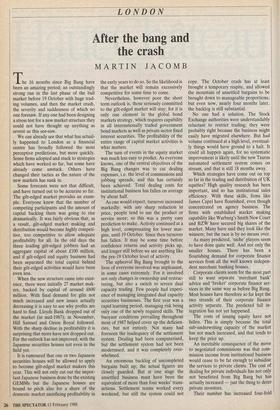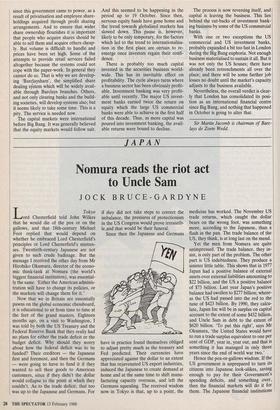After the bang and the crash
MARTIN JACOMB
The 16 months since Big Bang have been an amazing period; an outstandingly strong run in the last phase of the bull market before 19 October with huge trad- ing volumes, and then the market crash, the severity and suddenness of which no one foresaw. If any one had been designing a stress test for a new market structure they could not have thought up anything as severe as this see-saw.
We can already see that what has actual- ly happened to London as a financial centre has broadly followed the most perceptive predictions, but more quickly. Some firms adopted and stuck to strategies which have worked so far, but some have already come unstuck. Others have changed their tactics as the nature of the new markets has sunk in.
Some forecasts were not that difficult, and have turned out to be accurate so far. The gilt-edged market provides an exam- ple. Everyone knew that the number of competing participants and the amount of capital backing them was going to rise dramatically. It was fairly obvious that, as a result, gilt-edged market making and distribution would become highly competi- tive, too competitive to allow adequate profitability for all. In the old days the three leading gilt-edged jobbers had an aggregate capital of about £100 million, and if gilt-edged and equity business had been separated the total capital behind their gilt-edged activities would have been even less.
When the new structure came into exist- ence, there were initially 27 market mak- ers, backed by capital of around £600 million. With final demand for gilts not much increased and new issues actually decreasing it is easy to see why profits are hard to find. Lloyds Bank dropped out of the market (in mid-1987); in November, Hill Samuel and Orion Royal followed. With the sharp decline in profitability it is surprising that more have not dropped out. For the outlook has not improved, with the Japanese securities houses not even in the field yet.
It is rumoured that one or two Japanese securities houses will be allowed to apply to become gilt-edged market makers this year. This will not only cut out the impor- tant Japanese business done by the existing GEMMs but the Japanese houses are bound to pitch also for a share of the domestic market sacrificing profitability in the early years to do so. So the likelihood is that the market will remain excessively competitive for some time to come.
Nevertheless, however poor the short term outlook is, those seriously committed to the gilt-edged market will stay; for it is only one element in the global bond markets strategy, which requires capability in all internationally traded government bond markets as well as private sector fixed interest securities. The profitability of the entire range of capital market activities is what matters.
The turn of events in the equity market was much less easy to predict. As everyone knows, one of the central objectives of the Big Bang changes was to cut dealing expenses, i.e. the level of commissions and jobbing spreads; and this has certainly been achieved. Total dealing costs for institutional business has fallen on average by about half.
As one would expect, turnover increased markedly: with any sharp reduction in price, people tend to use the product or service more; so this was a pretty easy prediction to make. Activity continued at a high level, compensating for lower mar- gins, until 19 October. Since then turnover has fallen. It may be some time before confidence returns and activity picks up, and longer still before we see anything like the pre-19 October level of activity.
The upheaval Big Bang brought to the lives of everyone involved was unpleasant, in some cases extremely. For it involved not only changes in ownership and restruc- turing, but also a switch to screen dual capacity trading. Few people had experi- ence of managing integrated dual capacity securities businesses. The first year was a rapid learning period, managing risk being only one of the newly required skills. The buoyant conditions prevailing throughout most of 1987 helped cover up the deficien- cies, but not entirely. Not many had foreseen the inadequacy of the settlement system. Dealing had been computerised, but the settlement system had not been modernised, and it was completely over- whelmed.
An enormous backlog of uncompleted bargains built up; the actual figures are closely guarded. But at one stage the unsettled business must have been the equivalent of more than four weeks' trans- actions. Settlement teams worked every weekend, but still the system could not cope. The October crash has at least brought a temporary respite, and allowed the mountain of unsettled bargains to be brought down to manageable proportions; but even now, nearly four months later, the backlog is still substantial.
No one had a solution. The Stock Exchange authorities were understandably reluctant to restrict trading; they were probably right because the business might easily have migrated elsewhere. But had volume continued at a high level, eventual- ly things would have ground to a halt. It could all happen again, for no systematic improvement is likely until the new Taurus automated settlement system comes on stream, and that is still 18 months away.
Which strategies have come out on top so far in the trading and distribution of UK equities? High quality research has been important, and so has institutional sales efficiency. With these skills, firms _like James Capel have flourished, even though concentrated on agency business. The firms with established market making capability like Warburg's Smith New Court and BZW have secured big shares of the market. Many have said they look like the winners; but the race is by no means over.
As many predicted, 'niche' players seem to have done quite well. And not only the smaller houses. There has been a flourishing demand for corporate finance services from all the well known indepen- dent merchant banking houses.
Corporate clients seem for the most part still to want separate 'merchant bank' advice and 'broker' corporate finance ser- vices in the same way as before Big Bang. Most houses have therefore so far kept the two strands of their corporate finance activity separate. The predicted full in- tegration has not yet happened.
The costs of issuing equity have not fallen. This is simply because the total sub-underwriting capacity of the market has not much increased, and that tends to keep the price up.
An inevitable consequence of the move to negotiated commissions was that com- mission income from institutional business would cease to be fat enough to subsidise the services to private clients. The cost of dealing for private individuals has not only not benefitted from Big Bang but has actually increased — just the thing to deter private investors.
Their number has increased four-fold since this government came to power, as a result of privatisation and employee share- holdings acquired through profit sharing arrangements. And to ensure that wider share ownership flourishes it is important that people who acquire shares should be able to sell them and acquire others cheap- ly. But volume is difficult to handle and prices have been set high. Some of the attempts to provide retail services failed altogether because the systems could not cope with the paper-work. In general they cannot do so. That is why we are develop- ing `Barclayshare', the simplified share dealing system which will be widely avail- able through Barclays branches. Others, and not only clearing banks and the build- ing societies, will develop systems also; but it seems likely to take some time. This is a pity. The service is needed now.
The capital markets were international before Big Bang. It was generally believed that the equity markets would follow suit. And this seemed to be happening in the period up to 19 October. Since then, nervous equity funds have gone home and the trend towards globalised markets has slowed down. This pause is, however, likely to be only temporary, for the factors which led to the trend to internationalisa- tion in the first place are certain to re- emerge once investors regain their confi- dence.
There is probably too much capital invested in the securities business world- wide. This has its inevitable effect on profitability. The cycle always turns where a business sector has been obviously profit- able. Investment banking was very profit- able until recently. The major US invest- ment banks earned twice the return on equity which the large US commercial banks were able to achieve in the first half of this decade. Thus, as more capital was poured into investment banking, the avail- able returns were bound to decline. The process is now reversing itself, and capital is leaving the business. This lies behind the cut-backs of investment bank- ing business by some of the US commercial banks.
With one or two exceptions the US commercial and US investment banks, probably expanded a bit too fast in London during the Big Bang euphoria. Not enough business materialised to sustain it all. But it was not only the US houses; there have already been retrenchments all over the place; and there will be some further job losses no doubt until the market's capacity adjusts to the business available.
Nevertheless, the overall verdict is clear- ly that London has consolidated its posi- tion as an international financial centre since Big Bang, and nothing that happened in October is going to alter that.
Sir Martin Jacomb is chairman of Barc- lays de Zoete Wedd.



























































 Previous page
Previous page